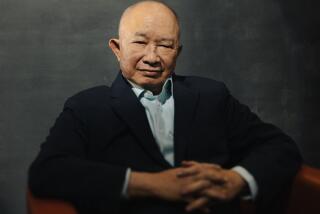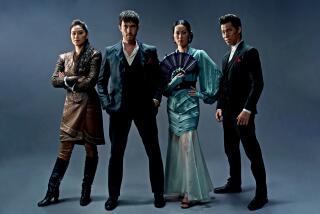On the Case in China
- Share via
Eight years after the NBC show “Hunter” left American airwaves, the unorthodox cop played by Fred Dryer remains a popular hero in the most unlikely of places--the People’s Republic of China.
Through reruns of “Hunter” that still appear in syndication on Chinese television, Dryer himself has emerged as such a hot commodity that the Communist Chinese now want the ex-NFL football star to make a feature-length film in their country later this year.
Alarmed at the rising level of drug abuse--particularly heroin--among their youth, the Chinese have asked Dryer to build an anti-drug message into his film, tentatively titled “Hunter in China.”
The film will reprise Dryer in the role of Sgt. Rick Hunter, the Los Angeles police officer he portrayed on U.S. television from 1984 to 1991. Stepfanie Kramer, who played his partner, Sgt. Dee Dee McCall, in the original series, is expected to co-star when shooting gets underway in September.
“They requested, ‘Please, can you do a drug story?’ ” Dryer said in a recent interview. “I’m not one to do a ‘Miami Vice’ deal where every week is a drug story, but when I went over there and saw the problem and talked to them, I said, ‘I’m going to give them what they want.’ ”
The film project has propelled Dryer and his Studio City-based production company, Fred Dryer
Productions, into the vanguard of Hollywood entertainment firms being courted by the Chinese.
In recent weeks, a delegation from the China Film Co-Production Corp. came to Los Angeles, where it encouraged studio executives and production companies to join it in co-financing films and suggested that they shoot inside China whenever their scripts call for a Chinese setting.
The visit came against a backdrop of chilly relations between Hollywood and Beijing because of the release in 1997 of three films by the Walt Disney Co., Sony Pictures Entertainment and Metro-Goldwyn-Mayer that depicted the Chinese government in a harsh light.
Since then, Disney Chairman Michael Eisner has traveled to China to mend fences and, as a result, Disney won permission to release its animated film “Mulan” in major Chinese cities.
Despite continuing talks with U.S. entertainment companies eager to do business there, China unveiled regulations recently that expressly forbid wholly owned foreign projects, which could dampen overseas investors’ interest.
The Chinese Love ‘Hunter’
Import negotiations aside, of all the American celebrities the Chinese could have courted, they chose Dryer because TV viewers back home long ago fell in love with his character in “Hunter.”
Under the proposal, Dryer said, China will release “Hunter in China” theatrically within its borders while allowing him to market the movie throughout the rest of the world.
“They are financing everything in China,” he said. “I’m financing what’s on this side and what’s above the line. We think that for about $3 million--and that goes a long way over there--we can make one hell of a film.”
It was only last August that Dryer felt the full impact of his celebrity status in China when he took a two-week trip there at the invitation of Changchun Film Festival in Manchuria.
In city after city, Dryer was thronged with fans, feted with banquets, welcomed into homes, and even asked to dine on fried scorpions--a delicacy he politely avoided.
Standing beside the Great Wall, the former Los Angeles Rams all-pro defensive end donned a military cap emblazoned with a communist red star and posed for pictures with Chinese fans.
At the Changchun Film Festival, Dryer witnessed a moving tribute to soldiers who had valiantly tried to save lives during devastating floods that ravaged portions of the country. He then joined the audience in a procession leading past a large drum, where they made contributions to aid the flood victims.
Chunping Shen, a Rosemead lawyer who served as interpreter on the trip, said that whenever Dryer would leave a hotel, fans would rush up to his car and hand him 20 to 30 postcards asking that “Hunter” sign for autographs.
“He is the most recognizable American star in China,” said Shen, who now acts as legal advisor to Dryer on his Chinese business ventures.
Shen, the son of a retired provincial governor, said “Hunter” is popular because it was one of the first American shows to air on Chinese TV in the late 1980s.
What Chinese viewers like most about “Hunter,” Shen said, is his character.
“He’s very tall, very handsome, very different looking,” Shen explained. “Also, he plays a very brave, smart, interesting, humorous type of character.” While the show had no shortage of car wrecks, fistfights and explosions, it avoided gratuitous violence.
For Dryer, the trip to China proved eye-opening as he witnessed a vast nation bustling with commerce.
“There is construction going on all over that country,” Dryer said. “They are getting companies, businesses and entertainment to the heartland of China, all the way to the Tibetan province, all the way to the Mongolian desert and all the way south to the Cambodian border. It’s not just the east coast that’s developing. They are exploding.”
But what he also discovered is that the Chinese continue to hold the family in the highest regard.
“What you have is a strong patriarchal, family-driven society that reveres old people, the wisdom of old people. . . . They do things together. It’s like our country was in the 1950s.”
While not unmindful of the criticism aimed at Communist China over its human rights record, Dryer believes that by expanding cultural and business ties with the West, China might one day soften its hard-line approach to political issues.
“What China has been doing culturally, governmentally and religious-wise is none of Fred Dryer’s business,” he said. “I’m not there to discuss their political views at all. I’m there creatively to make films in cooperation [with them]. Now, hopefully, through that relationship and through more relationships like that, there will be an understanding and a softening.
“You’re not going to, all of a sudden, pass a law saying communism is illegal,” Dryer added. “. . . So, the best way to have an impact is to say, ‘We don’t agree with that, however, we are still here to do business and have a cultural exchange.’ ”
His China trip would lay the groundwork for a remarkable business opportunity for the 6-foot-6 ruggedly handsome actor.
Once the “Hunter in China” script--written by Derek Daller Chase--is completed, Dryer plans to go to China again in July to hammer out the details of the co-production deal.
Dryer said the script will include a love story between Hunter and a Chinese female police officer and, as a subplot, McCall will discover the connection between her American Indian roots and her lineage to Asia.
He expects to shoot five days in Los Angeles beginning in September and the remaining 90% of the movie in China, from Beijing’s Tiananmen Square to the foothills of Tibet and, perhaps, even the Gobi Desert.
“The film is going to expose the rest of the world to things they really haven’t seen out of China by Western filmmakers,” Dryer said.
Dryer expects to release the film theatrically in countries where he enjoys a strong fan base: Germany, Italy, France and South America. U.S. domestic television rights have not yet been negotiated.
Tanned and still physically fit all these years after leaving pro football, Dryer grew up in the South Bay, attended El Camino College and then San Diego State before becoming a first-round draft pick of the New York Giants. He was later traded to the Rams, playing in Super Bowl XIV.
Dryer Landed His Big Role in 1984
He got his first taste of Hollywood in the early 1970s, when a filmmaker friend invited Dryer and other members of the Rams to appear in a movie. By the late 1970s, feeling “antsy” that time was creeping up on his athletic career, Dryer began taking acting lessons and, in 1984, landed the lead role in “Hunter.”
Since the show’s cancellation, Dryer has kept active both in front of and behind the camera. In 1995, he went to Mexico and shot a two-hour movie called “Land’s End,” which evolved into a 20-episode syndicated TV series.
In his private life, Dryer takes particular joy in his daughter, Caitlin, who turns 15 this month and is attending an East Coast boarding school.
“I’m the luckiest guy I know,” he said. “I’ve got great friends and great people to work with every day and my daughter is thriving and I’m doing what I want to do.”
But his biggest disappointment, he said, is watching “how far television has sunk.”
In its obsession with the youthful demographic, network TV is “squashing out a lot of people who want to watch television.”
He also complained that American television has “done a tremendous job of destroying the father figure here in this country.”
With that in mind, Dryer says he warned the Chinese that before they expand their television programming, “Be very careful what you let into this country. Don’t all of a sudden say that for the sake of . . . being more Western that you are going to drop your standards, because that will threaten your family.”
He also had advice about China for his Hollywood counterparts.
“The film community needs to go there and create relationships,” Dryer said. “That’s how it works. It’s there if you mine it out. You just have to get out of Beverly Hills and go get it.”
More to Read
The biggest entertainment stories
Get our big stories about Hollywood, film, television, music, arts, culture and more right in your inbox as soon as they publish.
You may occasionally receive promotional content from the Los Angeles Times.










